What is OER?
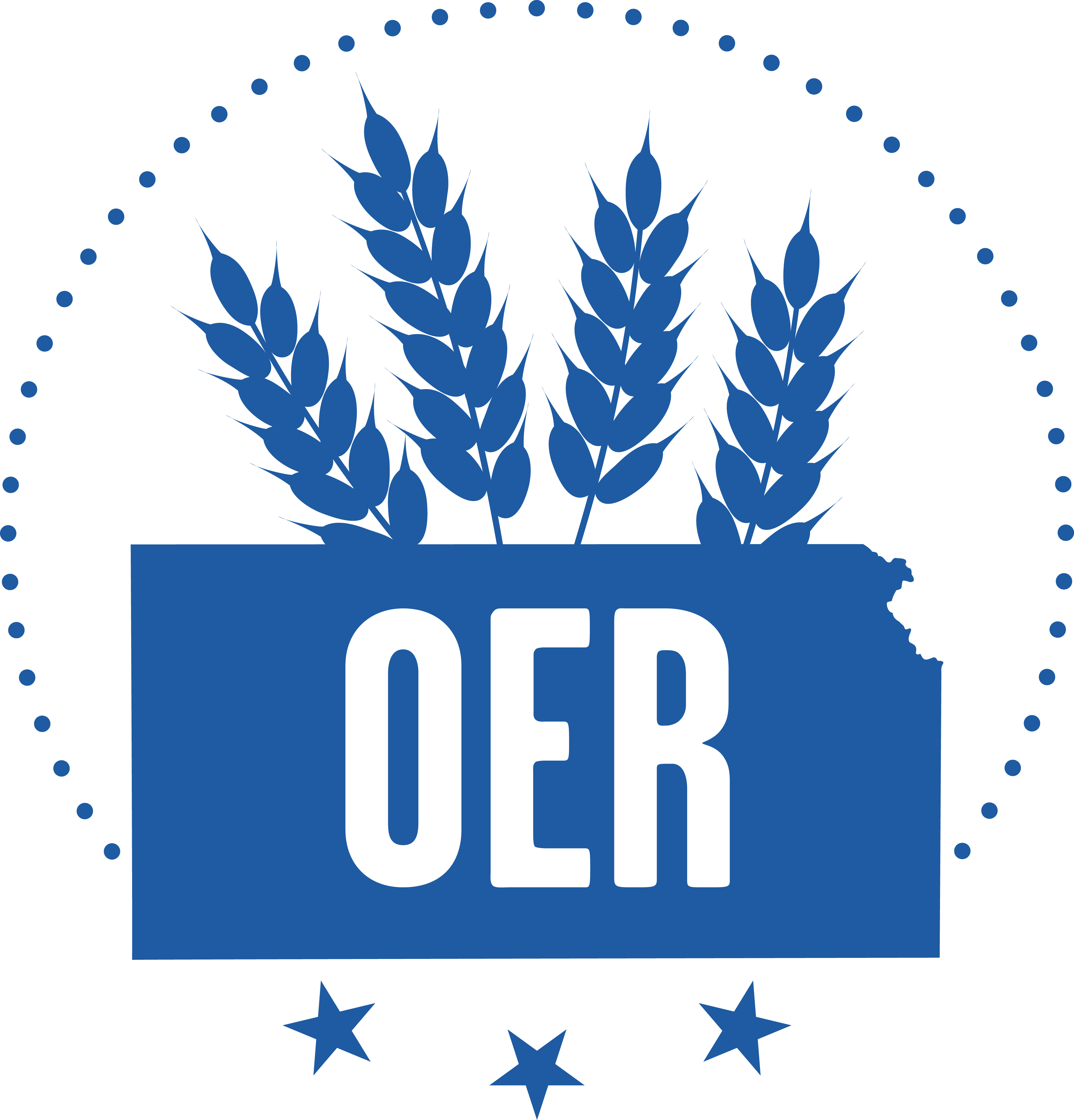 Open educational resources (OER) “are teaching, learning and research materials in any medium – digital or otherwise – that reside in the public domain or have been released under an open license that permits no-cost access, use, adaptation and redistribution by others with no or limited restrictions.”1 OER includes built in permission to retain, reuse, revise, remix, and redistribute the material.
Open educational resources (OER) “are teaching, learning and research materials in any medium – digital or otherwise – that reside in the public domain or have been released under an open license that permits no-cost access, use, adaptation and redistribution by others with no or limited restrictions.”1 OER includes built in permission to retain, reuse, revise, remix, and redistribute the material.
In an effort to exhibit the need for OER at institutions across the state of Kansas, the Kansas Board of Regents Student Advisory Committee conducted a survey in 2019 to demonstrate the burden of textbook costs on students at Regent Institutions. They found that 48 percent of 6,474 regent institutions’ students indicated they did not purchase or rent a required textbook in the spring semester. Seventeen percent said they did not purchase or rent three or more required textbooks.2 By not purchasing textbooks, students could be at a disadvantage, which could hinder their success in a course. With open/alternative educational resources, all students get equal and immediate access to educational materials.3
Mission
Our mission is to increase access and equity in education by scaling the awareness and support of open education, including open educational resources and associated practices and pedagogies across the Kansas Board of Regents (KBOR) system.
Vision
Our vision is to improve student outcomes and access through increasing the thoughtful integration of high quality, open educational resources into teaching and learning across the Kansas Board of Regents system.
Link to Kansas LibreTexts Commons.
Why OER?
Hear Fort Hays State University Student Body President, Mark Faber give an address to the February 2022 Kansas OER Summit attendees about how OER impacts students. Click here to listen to his speech.
Newsletters
Statewide OER Steering Committee
To encourage OER use across public institutions in the state of Kansas, the OER Steering Committee was developed and is made up of representatives across Kansas public institutions who are interested in OER on their campuses. The group convenes once a month to discuss statewide initiatives, including collaborative events, grant applications, system participation in regional and national OER organizations, OER platforms, and best practices. If your institution does not have a representative on the OER Steering Committee and you would like to add someone, email Mistie Knox,
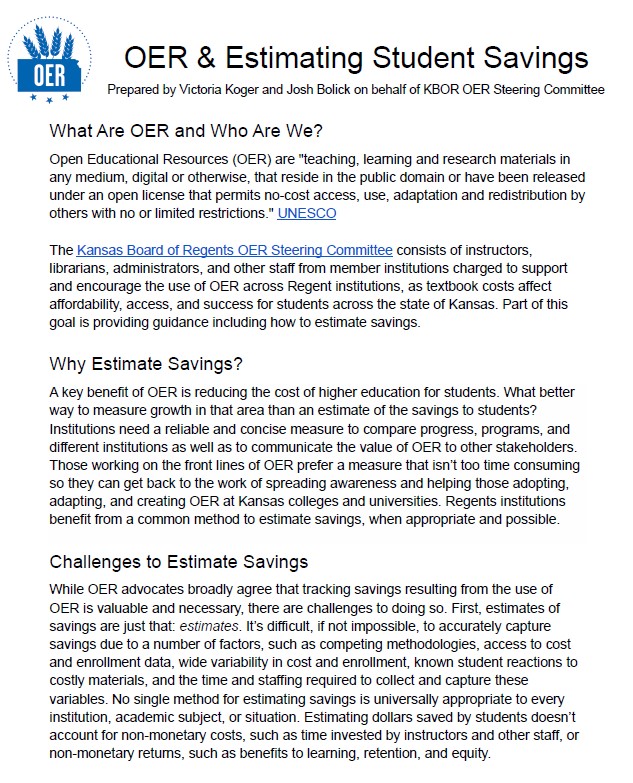 |
OER & Estimating Student Savings Developed in January 2022, the OER Steering Committee recommendation outlines a formula for estimating savings resulting from OER use in KBOR System institutions. While it's difficult, if not impossible to accurately capture savings due to a variety of factors, the Steering Committee members believe that Kansas System institutions benefit from a common method to estimate savings, when appropriate and possible. This paper outlines our recommendations, sites other research and policies around estimating cost savings, and explains the rationale behind developing this formula. |
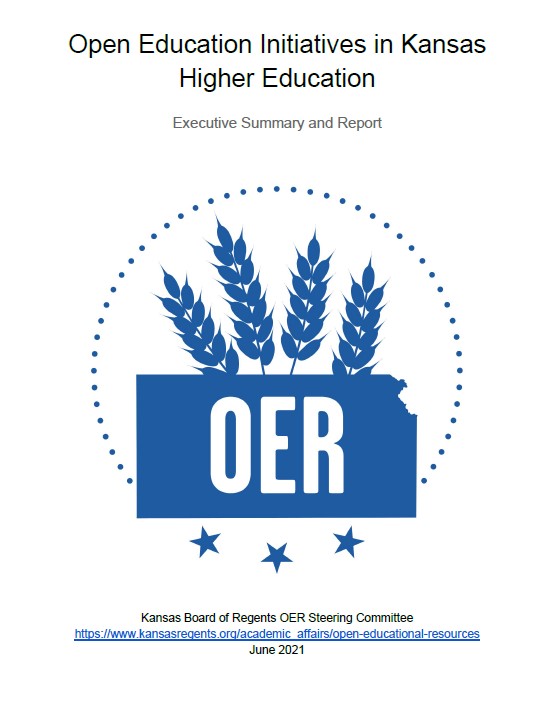 |
2022 Open Education Initiatives in Kansas Higher Education Report (pdf) January 2021, the OER Steering Committee sent out the first survey to gather information on how Open Education Resources (OER) are currently being implemented across the public higher education institutions in Kansas. The survey was repeated in the spring of 2022. This is the second report summarizing the OER initiatives across our system. For more information about this survey, report or KBOR system initiatives click here |
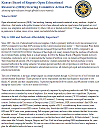 |
The Kansas Board of Regents Open Educational (OER) Steering Committee Action Plan (pdf) was developed as a result of the 2019 student-focused survey conducted by the Kansas Board of Regents Student Advisory Committee and collaborative discussion among members of the OER Steering Committee. The plan explains what OER are as well as the statewide priorities. |
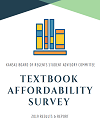 |
The Textbook Affordability Survey 2019 Results & Report (pdf) was conducted by the 2018-2019 Student Advisory Committee to provide concrete data behind the burden of textbook costs that students attending our universities are facing. |
2024-25 Members of the Open Educational Resources Steering Committee
System Memberships & Partnerships
Midwestern Higher Education Compact (MHEC)
The Midwestern Higher Education Compact (MHEC) has promoted and facilitated the implementation of Open Educational Resources (OER) at a regional level since 2018 when twelve OER state action teams were created. From these initiatives, the Kansas OER Steering Committee began, and they continue to support our work through grant funding, research, regional raining and sponsorship of our Kansas OER Summit.
Open Education Network (OEN)
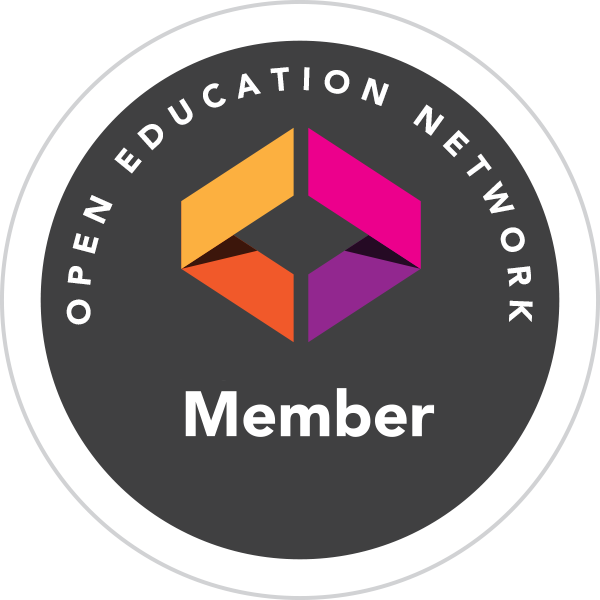
In 2020, the Kansas Board of Regents joined the Open Education Network (OEN) as a consortial member.
A diverse community of higher education institutions, the Open Education Network promotes access, affordability, and student success through the use of open textbooks.
Driving OER Sustainability for Student Success (DOERS3)
The Kansas Board of Regents is part of the Driving OER Sustainability for Student Success (DOERS3) Collaborative. Open to public higher education systems and statewide/provincewide organizations, DOERS3 and its members support large-scale OER initiatives and are committed to advancing innovation in OER. Member organizations aim to achieve equity and student success at scale by realizing the promise of high-quality, accessible, and sustainable OER implementations.
References
1 Kansas Board of Regents Student Advisory Committee Textbook Affordability Survey: 2019 Results & Report
2 UNESCO
3 https://opencontent.org/definition/
OER logo credit: Barton Community College
